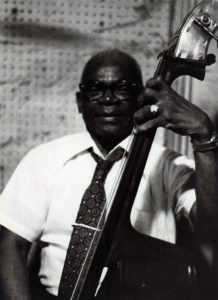Chester Zardis
Chester Zardis, a New Orleans traditional jazz string bass player, was also known as "Bear" or "Little Bear."

Courtesy of Louisiana State Museum
Chester Zardis. Marks, Grauman (Photographer)
Chester Zardis was a New Orleans traditional jazz string bass player who was known as an outstanding bassist with a hard-hitting, percussive-yet-melodic delivery. Zardis’s small stature earned him the nicknames “Bear,” “Little Bear,” and “Little Chester” over the course of his career. He had close working musical relationships with many jazz greats, including Buddy Petit, Chris Kelly, Kid Rena, Kid Howard, Sidney Desvigne, George Lewis, Danny Barker, and even Count Basie for a short time. In his later years Zardis was a fixture at Preservation Hall. He is the subject of three documentary films: Liberty Street Blues, Chester Zardis: Spirit of New Orleans, and Three Men of Jazz.
Zardis was born on May 27, 1900, in New Orleans. As a child he was often in trouble for fighting and other incidents, and he was sent to Captain Jones’s Colored Waif’s Home for a time. The home had a host of other alumni who would grow up to be legendary jazz musicians, including Louis Armstrong, Kid Rena, and Kid Shots.
In 1915 Zardis met Billy Marrero, from whom he bought an old string bass and began to take lessons. From a very young age Zardis worked numerous odd jobs to help support his family. While taking lessons from Marrero, he worked as a porter in a movie house. Soon Zardis began lessons with Dave Perkins, who taught him how to read music. While playing bass in the Merit Band, a Seventh Ward neighborhood ensemble, Zardis’s skills were noticed by Buddy Petit’s banjo player, Buddy Manaday, who recommended the young Zardis to Petit. Zardis would join Petit’s band, playing with them for a number of years on riverboat gigs, lakefront jobs, and other engagements.
In 1925 Zardis began to play with Rena, followed by short stints with Chris Kelly, Jack Carey, Kid Clayton, and Kid Howard; he also performed with the influential Black Eagle Band of Crowley. Zardis reportedly supplemented his income by working as a prison guard by day and would keep weapons in his house and on his person for self-defense. Late in life he confided to writer and jazz musician Tom Sancton that while he was walking home during the early morning hours after a New Orleans gig with Rena’s band, a pair of white men in a car started harassing him. When one of them got out and tried to hit Zardis, he pulled out a razor and cut his attacker; the next day the newspaper reported that a “Negro” had killed a man during an attempted robbery. At least one fellow musician told Sancton that he wouldn’t perform with Zardis because of the bassist’s violent streak.
Zardis played with Sidney Desvigne and led his own band from 1935 to 1938. Zardis would enjoy widespread success after being featured on (now classic) recordings with Bunk Johnson in 1942 and George Lewis in 1943. “Milneburg Joys,” “Careless Love,” and “Climax Rag” are all standout recordings from Lewis’s sessions. These recordings were not Zardis’s first sessions, however––that distinction goes to the home recordings he made with Kid Howard’s band in the late 1930s. British jazz musician and scholar Barry Martyn would later hear these recordings in 1963 and release them on his Music of New Orleans (MONO) label. Zardis’s exciting bass work in these sessions is prominently featured.
After serving in World War II, Zardis played with bands in Denver and Philadelphia before joining Herb Morand to play gigs on the Mississippi Gulf Coast. In 1954 Zardis quit performing publicly and began farming in New Iberia. Upon his return to New Orleans in 1965, he embarked on a successful revival of his musical career, rejoining old friends George Lewis and Percy Humphrey and playing frequently with Billie and DeDe Pierce at Preservation Hall. Zardis would record with the Pierces in 1966 on the Preservation Hall label. In 1967 Zardis toured Japan with Kid Sheik and his Storyville Ramblers. Zardis’s final years were filled with music, festivals, adoring audiences, and world tours.
Zardis died on August 14, 1990.
